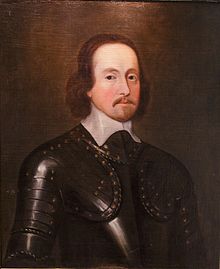| Battle of Lisnagarvey | |||||||
|---|---|---|---|---|---|---|---|
| Part of Cromwellian conquest of Ireland | |||||||
 Sir Charles Coote, Commonwealth commander in Northern Ulster | |||||||
| |||||||
| Belligerents | |||||||
|
|
| ||||||
| Commanders and leaders | |||||||
|
|
| ||||||
| Strength | |||||||
| c. 5,000 | c. 3,000 | ||||||
| Casualties and losses | |||||||
| c. 1,500 killed or captured | minimal | ||||||
The Battle of Lisnagarvey (or Lisnetrain) was fought on 6 December 1649, near Lisnagarvey (now Lisburn) during the Irish Confederate Wars, an associated conflict of the 1638 to 1651 Wars of the Three Kingdoms. Forces loyal to the Commonwealth of England defeated an army supporting Charles II of England, composed of Royalists and Scots Covenanters.
In early December, Sir Charles Coote and Robert Venables advanced on Carrickfergus, the only northern port not controlled by the Commonwealth. Covenanter leader George Munro joined forces with his Royalist colleague Lord Clandeboye in order to prevent this.
On 6 December, the two advance guards clashed at Lisnagarvey; despite greater numbers, the Royalist-Covenanter army was no match for their more experienced opponents. Most of their army fled without firing a shot and retreat quickly became a rout, with over 1,500 killed or captured in the pursuit.
Lord Clandeboye surrendered shortly afterwards, followed by Carrickfergus on 13 December. Munro escaped to Enniskillen, before returning to Scotland early in 1650.